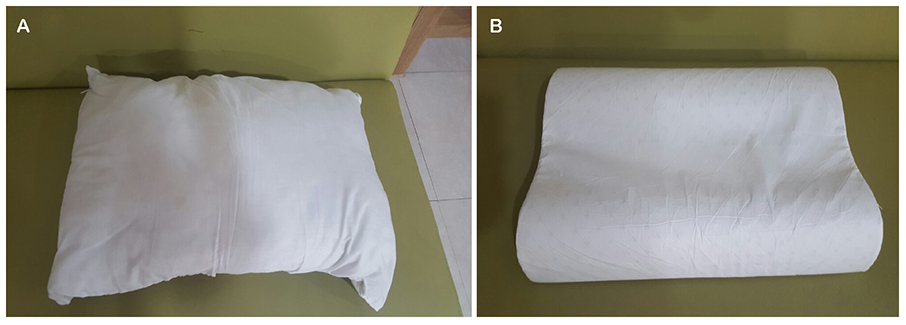Korean J Health Promot.
2019 Jun;19(2):107-113. 10.15384/kjhp.2019.19.2.107.
Comparison of Neck Pain, Shoulder Pain, and Comfort between Buckwheat and Latex Pillows
- Affiliations
-
- 1College of Nursing, Daegu Health College, Daegu, Korea.
- 2College of Nursing, Keimyung University, Daegu, Korea. soo1005@kmu.ac.kr
- KMID: 2452948
- DOI: http://doi.org/10.15384/kjhp.2019.19.2.107
Abstract
- BACKGROUND
This study aimed to investigate differences in neck pain, shoulder pain, and comfort between buckwheat and latex pillows in elderly sanatorium residents.
METHODS
The crossover experimental study was performed with 30 elderly patients in a convalescent hospital for seniors. The buckwheat and latex pillows were used for 2 weeks, the 7 day was assigned as the washout between each one week intervention, respectively. Pre- and posttest visual analog scale (VAS) scores for neck and shoulder pains and the neck disability index (NDI) were investigated. Data were analyzed using paired-samples t test, and their correlations were analyzed using SPSS/WIN 21.0 (IBM Corp., New York, NY, USA).
RESULTS
After the 2-week intervention, results showed that the use of buckwheat pillows decreased the VAS scores for neck and shoulder pains and NDI. Further, the use of latex pillows decreased the VAS score for neck pain and NDI, but the VAS score for shoulder pain showed no statistically significant differences (t=1.887, P=0.069).
CONCLUSION
In conclusion, using latex and buckwheat pillows is the best option for reducing neck pain. Between the buckwheat and latex pillows, the buckwheat pillow is a better option for decreasing neck and shoulder pains.
Keyword
MeSH Terms
Figure
Reference
-
1. Lim HJ, Hong JH. In : Proceedings of the Korean Society of Precision Engineering Conference; 2012 May 30; Seoul, Korea. Korean Society for Precision Engineering;2012. p. 779–780.2. Shin KR, Kang YH, Park HJ, Kim KH, Jin LH. Depression, somatoform disorders, and quality of life between poor sleepers and good sleepers in community-dwelling older adults. Korean J Adult Nurs. 2011; 23(4):332–339.3. Hwang IC, Kim KK, Choi CH, Lee KS, Suh HS. Relationship between sleep duration, sleep satisfaction and metabolic syndrome. Korean J Health Promot. 2010; 10(2):71–77.4. Kim CH, Shin HC. Are sleep disturbance symptoms of chronic fatigue syndrome distinct? Korean J Health Promot Dis Prev. 2004; 4(3):171–177.5. Yu IS. The importance of selecting the right pillow. Journal of Korean Society of Steel Construction. 2012; 24(1):69.6. Heo JG, Yeong Y. The effect ergonomic pillow in patient with chronic neck pain. J Ergon Soc Korea. 2006; 25(1):17–25.
Article7. Yun SY, Choi JY. A comparative study on learning outcomes according to the Integration sequences of S-PBL in nursing students: randomized crossover design. J Korean Acad Nurs. 2019; 49(1):92–103.
Article8. Jeon HM, Choi YR, Park SE, An HJ, Lee SB, Choi WS, et al. Influences of chronic shoulder pain on muscle tone changes in trunk muscles. J Int Acad Phys Ther Res. 2013; 4(1):510–515.
Article9. Shin GH. The study of neck fatigue and body pressure according to the pillow's type and the cervical vertebrae's angle [master's thesis]. Busan: Dongeui University;2010. Korean.10. Wang JM, Kim DG. Assessment of the spinal pain using visual analogue scale (VAS). J Korean Soc Spine Surg. 1995; 2(2):177–184.11. Song KJ, Choi BW, Kim SJ, Yoon SJ. Cross-cultural adaptation and validation of the Korean version of the neck disability index. J Korean Orthop Assoc. 2009; 44(3):350–359.
Article12. Lee E, Shin WS, Jung KS, Chung YJ. Reliability and validity of the neck disability index in neck pain patients. Phys Ther Korea. 2007; 14(3):97–106.13. Kolcaba K. Comfort Theory and Practice: A vision for Holistic Health Care and Research. New York: Springer Publishing Co.;2003. p. 205–214.14. Jeon HC, Yang KW, Kim KH, Kim SK, Kim HK, Seo JI, et al. Relationship of pain, disability and quality of life in individual with neck and shoulder pain. J Korean Phys Ther. 2016; 28(5):328–333.
Article15. Cheng SY, Lin PC, Chang YK, Lin YK, Lee PH, Chen SR. Sleep quality mediates the relationship between work-family conflicts and the self-perceived health status among hospital nurses. J Nurs Manag. 2019; 27(2):381–387.
Article16. Sung MJ, Sung SG. The effects of pillow filling materials on the comfortable sleep. J Korean Soc Clothing Ind. 2006; 8(6):713–720.17. Nicassio PM, Wallston KA. Longitudinal relationships among pain, sleep problems, and depression in rheumatoid arthritis. J Abnorm Psychol. 1992; 101(3):514–520.
Article18. Kwon HJ, Kim JS, Lee JH, Jang HG, Cho SW. The study on pillow height for arm paresthesia patients. J Korean Med Rehabil. 2014; 24(3):165–171.19. Park DE. Functional evaluation of eco-friendly pillows by measuring cervical stability, head pressure, and muscle activity [master's thesis]. Seoul: Hanyang University;2007. Korean.
- Full Text Links
- Actions
-
Cited
- CITED
-
- Close
- Share
- Similar articles
-
- Endotoxin and House Dust Mite Allergen Levels on Synthetic and Buckwheat Pillows
- Dermatophagoides Farinae, an Important Allergenic Substance in Buckwheat-Husk Pillows
- Studies on the Neck and Shoulder Pain
- Ultrasound-Guided Injection in the Management of Shoulder Pain
- Radiologic Finding of Patients with Neck Pain


